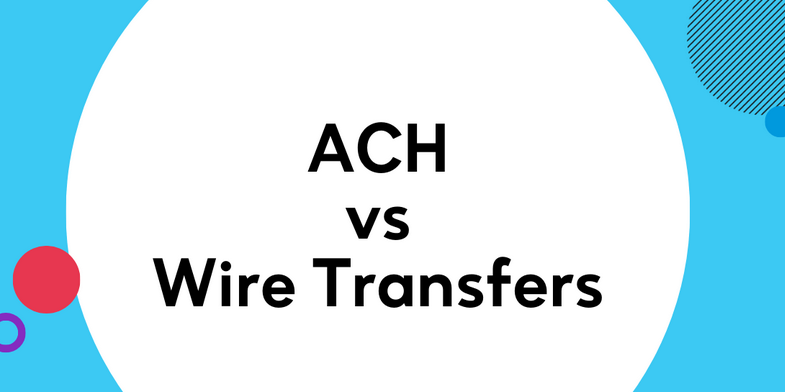Navigating the world of payment methods can be confusing, especially when it comes to understanding the differences between ACH transfers and wire transfers. Both are popular electronic payment options, but they have distinct characteristics that make them suitable for different situations. In this comprehensive guide, we will explore what ACH transfers and wire transfers are, how they work, and highlight the key differences between these two methods. By the end of this article, you’ll be able to determine which option is best for your specific payment needs.
What is an ACH Transfer?
An ACH (Automated Clearing House) transfer is an electronic payment method that facilitates the transfer of funds between bank accounts within the United States. It is commonly used for various types of transactions, including direct deposits, bill payments, and online transfers.
How ACH Transfers Work
ACH transfers follow a standardized process, including the following key steps:
- Authorization: The sender initiates the ACH transfer, providing the necessary details such as the recipient’s bank account number and routing number.
- Verification: The ACH network verifies the sender’s authorization and the availability of funds in the sender’s account.
- Batch Processing: ACH transfers are often processed in batches, which means they may not be immediate and can take a few business days to complete.
What is a Wire Transfer?
A wire transfer, also known as a bank transfer or credit transfer, is an electronic payment method used for transferring funds between banks or financial institutions, both domestically and internationally. Wire transfers are often preferred for high-value and time-sensitive transactions.
How Wire Transfers Work
Wire transfers involve the following key steps:
- Authorization: The sender initiates the wire transfer by providing their bank with the recipient’s bank details, including account number and SWIFT/BIC code for international transfers.
- Verification: The sending bank verifies the sender’s authorization and ensures that sufficient funds are available.
- Real-Time Transfer: Unlike ACH transfers, wire transfers are processed in real-time or near real-time, resulting in immediate availability of funds to the recipient.
Differences between ACH Transfers and Wire Transfers
Let’s compare ACH transfers and wire transfers based on the following aspects:
Speed of Transfer
ACH Transfer: ACH transfers generally take a few business days to complete, making them more suitable for non-time-sensitive transactions.
Wire Transfer: Wire transfers are processed in real-time or within a few hours, making them ideal for urgent or high-value transactions.
Fees
ACH Transfer: ACH transfers are usually more cost-effective or even free compared to wire transfers.
Use Cases
ACH Transfer: ACH transfers are commonly used for payroll, bill payments, and recurring transactions.
Wire Transfer: Wire transfers are preferred for large purchases, business-to-business transactions, and international payments.
International Transfers
ACH Transfer: ACH transfers are limited to domestic transfers within the United States.
Wire Transfer: Wire transfers are used for both domestic and international transfers.
Security
ACH Transfer: ACH transfers are considered secure, but they may have a higher risk of fraud compared to wire transfers.
Wire Transfer: Wire transfers are highly secure due to their real-time processing and verification.
Which Option Is Best for Payments?
Let’s explore the ideal scenarios for using ACH transfers and wire transfers:
B2B Payments
For Business-to-Business (B2B) payments, wire transfers are often preferred due to their speed and immediate availability of funds.
Personal Payments
For personal payments, such as paying bills or transferring funds to friends and family, ACH transfers are a cost-effective choice.
Conclusion:
Understanding the differences between ACH transfers and wire transfers empowers individuals and businesses to make informed decisions when choosing a payment method. ACH transfers are ideal for non-time-sensitive transactions, while wire transfers are preferred for urgent and high-value transactions. By considering factors such as speed, fees, use cases, and security, you can confidently select the most suitable payment method for your specific needs. Whether it’s for personal payments or business transactions, both ACH transfers and wire transfers offer efficient and secure ways to move funds electronically.
FAQs about ACH Transfer vs Wire Transfer
Q1: How long does an ACH transfer take vs a wire transfer?
ACH Transfer: ACH transfers typically take a few business days to complete.
Wire Transfer: Wire transfers are processed in real-time or within a few hours.
Q2: How much is a wire transfer fee?
Wire Transfer: Wire transfer fees can vary depending on the banks involved and whether the transfer is domestic or international. Fees typically range from $20 to $50 for domestic transfers and higher for international transfers.
Q3: Does ACH mean direct deposit?
Yes, direct deposit is a form of ACH transfer where funds are electronically deposited into a recipient’s bank account.
Q4: Which is safer ACH or wire transfer?
Wire Transfer: Wire transfers are generally considered safer due to their real-time processing and verification, making them less susceptible to fraud compared to ACH transfers.




